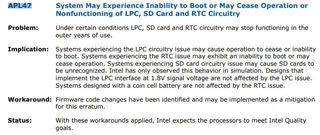Intel Moonwalks on Apollo Lake, Says Consumer Chips Aren't Dying After All (Updated)

Update 9/13/2019 13:32pm PT:
After an extended period of back and forth with Intel, we have confirmed that the existing B-1 stepping chips do suffer from the LPC bus degradation issue, which is rectified via a firmware update. This issue is classified as Errata APL47, as listed here (PDF). When the B-1 Stepping is used in accordance to the published specifications and design guidelines, it meets PC Client and IOT usage requirements.
The new F-1 stepping products have the LPC bus degradation issue fixed in the silicon and will be available for order for 15 years.
We've amended the article below to include the new information and a portion of the errata/fix description.
Original Article, 9/11/2019 2:40pm PT:
Regrettable errors happen all the time in life, but we rarely see one of this proportion from the world's leading semiconductor producer. We reported this week on an Intel PCN (Product Change Notice) posted to its QDMS website that stated the Apollo Lake chips suffered from LPC bus degradation issues that have been tied to previous Intel chip recalls, but we noticed that Intel pulled the PCN from the company's website on the following day. Below you can see the original PCN that called out the LPC bug specifically as the reason for a stepping change to the processors.

We've never seen a PCN pulled from Intel's site, so we followed up with the company to investigate. Intel tells us it posted the PCN in error, and the new version has no reference to an LPC bus degradation issue.
Stay on the Cutting Edge
Join the experts who read Tom's Hardware for the inside track on enthusiast PC tech news — and have for over 25 years. We'll send breaking news and in-depth reviews of CPUs, GPUs, AI, maker hardware and more straight to your inbox.

Here you can see the new PCN (PDF) posted to Intel's site this morning. The new PCN clarifies the stepping change, with an obvious emphasis on assuring the chips are in fact reliable. But it doesn't answer the question of why the change is being made.
Intel's original LPC bus degradation issue with the Atom C2000 series had enough of an impact that the company had to create a reserve fund to cover the costs associated with replacing the processors, so it certainly wants to make it known that the issue doesn't impact all parts. Intel also provided us with this statement in regards to the change:
There are no changes to the B-1 Stepping of the Intel® Celeron® N3350, J3355, J3455 Processors and Intel Pentium N4200 Processor as they meet all Intel quality goals for PC Usage and will continue to be available. The F-1 Apollo Lake Intel Celeron N3350, J3355, J3455 Processors and Intel Pentium N4200 Processor meet all Intel quality goals for PC Usage. With IOTG's operational decision to converge onto a single package for all of the IOTG Apollo Lake Processors, the F-1 stepping Celeron N3350, J3355, J3455 Processors and Pentium N4200 Processor has a slight increase in Z height compared to the B-1 Stepping.
You'll also notice that this statement calls out that the chips meet Intel's "quality goals for PC usage," but doesn't mention long life product availability.
As noted above, after extensive back and forth with Intel, the company confirmed that the changes do stem from the LPC bus degradation errata. The existing B-1 stepping chips suffer from the LPC bus degradation issue, which is rectified via a firmware update.

This issue is classified as Errata APL47, as listed here (PDF). When the B-1 Stepping is used in accordance to the published specifications and design guidelines, it meets PC Client and IOT usage requirements.
The new F-1 stepping products have the LPC bus degradation issue fixed in the silicon and will be available for order for 15 years.

Paul Alcorn is the Managing Editor: News and Emerging Tech for Tom's Hardware US. He also writes news and reviews on CPUs, storage, and enterprise hardware.
-
StewartHH First thing I thought about when hearing this story is relationship with Lakefield but it sounds like some employee open mouth when they should not. But it does seam there is bug in previous chips and curious if it could be fix with bios update / micro code update.Reply -
bigdragon Intel is about as hyper-conscious of appearances as game publishers are. This looks to be damage control following Intel poking at AMD's long term reliability. This sort of flip flop statement changes what looked like Intel hypocrisy into a matter of integrity. I think the integrity ding is far worse than the hypocrisy.Reply
Intel seriously needs to get it together and focus on their products rather than their brand image. Muzzle the marketing and PR staff and support the engineers to deliver improved hardware and software. -
StewartHH Replybigdragon said:Intel is about as hyper-conscious of appearances as game publishers are. This looks to be damage control following Intel poking at AMD's long term reliability. This sort of flip flop statement changes what looked like Intel hypocrisy into a matter of integrity. I think the integrity ding is far worse than the hypocrisy.
Intel seriously needs to get it together and focus on their products rather than their brand image. Muzzle the marketing and PR staff and support the engineers to deliver improved hardware and software.
Seriously this about Apollo chips and any one would crazy to think of them aim at gaming. As far as Ryzen concerns they are not even in the picture here -desktop chips primary and what is last 2 years 3 or 4 revisions of Ryzen chips and lets not even get into AMD poking fun at Intel which yes I will omit they struggle getting over 14nm but the world is not just focus on gaming.
But AMD is good for Intel because it keeps them on their toes. But I believe computers need to involved more than just more cores. -
silverblue Doesn't matter. Intel released a slide deck within which they called Ryzen 3000's long-term reliability into question using "unproven theories". Given that they have just been forced into an about-face on Apollo Lake's discontinuation thanks to a firmware update, and given that AMD's released new firmware to allow Ryzen 3000 to better hit those boost clocks despite those reliability accusations, I think the real issue is Intel's integrity or lack of it, and one might argue that this is regardless of the type of product. As such, a comparison can and will be made. Any dirt that Intel throws at AMD will be believed by somebody, leading to baseless allegations like "AMD make unreliable processors". That sort of crap can damage a company and leads to lawsuits.Reply
Anandtech hasn't posted an article on this yet, but when they do, I fully expect you to post the same thing over there before getting half-a-dozen responses that mostly focus on your (quite obvious) Intel bias. -
AnybodyM Wow, pulling the document, what a dick move. This really doesn't look like the chips are not dying, this only looks like they don't want to admit it after all. I guess we'll see a lot of NAS devices dying in the next years - great!Reply
Even if the firmware fix works, many devices won't get it. -
bigdragon Reply
Companies taunt each other all the time. It's not unusual for them to pick at each other or even engage in hypocrisy -- AMD does it too.StewartHH said:Seriously this about Apollo chips and any one would crazy to think of them aim at gaming. As far as Ryzen concerns they are not even in the picture here -desktop chips primary and what is last 2 years 3 or 4 revisions of Ryzen chips and lets not even get into AMD poking fun at Intel which yes I will omit they struggle getting over 14nm but the world is not just focus on gaming.
But AMD is good for Intel because it keeps them on their toes. But I believe computers need to involved more than just more cores.
The problem here is that Intel hit AMD for longevity concerns on Ryzen CPUs, Intel revealed longevity concerns on Apollo Lake, and then Intel announced there are no longevity concerns with Apollo Lake while simultaneously releasing a new longevity-focused stepping. Intel picked a marketing fight with AMD via a longevity litmus test. Intel then revealed they failed their own litmus test with Apollo Lake. To save face, Intel is now denying that there is a problem with Apollo Lake while simultaneously releasing a new stepping and acting as if there is a problem. "Do what I say, not as I do." No, Intel; actions speak louder than words.
The whole situation looks like a self-inflicted, marketing-driven, integrity hit for Intel. They should have countered the hypocrisy claims by defining Ryzen as a desktop or gaming CPU while defining Apollo Lake as a resource-constrained or role-specific CPU. A resurgent AMD appears to be causing Intel to spend its resources on marketing convincing us that Intel is better rather than delivering that post-Core era knock-out punch we all expected a a year or two ago in response to Ryzen. -
bit_user ReplyIntel Moonwalks on Apollo Lake
Oh man. It's a shame more people won't get that.
@PaulAlcorn , it looks like somebody spent way too much time composing that image of a silicon wafer eclipsing the sun, with a silhouette of Michael Jackson in front. Nice job, though.
Respect.
Most Popular






